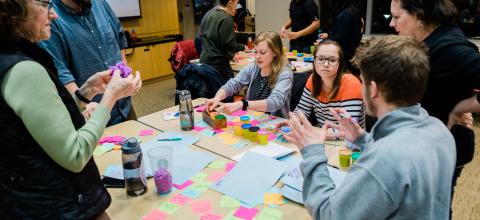About the Social Entrepreneurship Cluster
Total number of credits in this cluster: 9.5
The Social Entrepreneurship Cluster prepares students to effect sustainable and scalable social impact within marginalized communities in the United States and abroad. Classes are based in the Humanitarian Engineering and Social Entrepreneurship (HESE) program. The quest is to develop and deliver solutions that are technologically appropriate, environmentally benign, socially acceptable, and economically sustainable.
This cluster provides immersive, collaborative, multidisciplinary active-learning experiences that ground students in user-centered design for extreme affordability, systems thinking, ethical reflection, and scholarly research. Students work on multi-year social ventures and engage with partnering communities in the United States, East Africa, and other regions to research, design, field-test, and commercialize their ventures. Students engage in participatory action research (PAR) during their fieldwork in various countries. They engage in scholarly research with the objective of publishing the findings in refereed journals and conference proceedings.
Students who complete this cluster develop skills and knowledge in eight areas:
- Design products and services for marginalized populations in resource-constrained environments. Products must be technologically appropriate, environmentally benign, socially acceptable, and economically sustainable.
- Develop and implement business models and execution strategies to actualize technology-based social ventures.
- Collaborate with individuals from different countries, cultures, worldviews, and epistemological traditions to create sustainable value.
- Apply systems thinking to conceptualize, implement, and assess social ventures in chaotic resource-constrained environments.
- Determine the most appropriate and ethical solutions for specific real-world situations after careful consideration of the most salient facts, stakeholders, consequences, duties, virtues/underlying values, and relationships.
- Function effectively in multi-disciplinary cross-functional teams that include students and mentors from various colleges and representatives from partnering organizations.
- Communicate complex ideas to a wide swath of stakeholders in a concise and precise fashion. There is an emphasis on grassroots diplomacy: articulating ideas in a non-confrontational, non-controversial, and polite manner to advance the venture while strengthening relationships.
- Develop publication-quality manuscripts based on the findings of IRB-approved research endeavors.
Preferred Sequence of Courses for the Cluster
| Core Courses #1 and #2 | Credits | Semester |
|---|---|---|
| MGMT/ENTR 215 Entrepreneurial Mindset | 3 | 1-5 |
| ENGR/ENTR 310 Entrepreneurial Leadership | 3 | 3-6 |
| Social Entrepreneurship Cluster (9.5 credits) | Credits | Semester |
|---|---|---|
| ENGR 451 Social Entrepreneurship | 3 | Fall |
| Credits | Semester | |
|---|---|---|
| EDSGN 452 Projects in Humanitarian Engineering | 2 | Spring |
| EDSGN 453 Design for Developing Communities | 1 | Spring |
| Credits | Semester | |
|---|---|---|
| EDSGN 454 Humanitarian Engineering and Social Entrepreneurship Field Experience | 0.5 | Summer |
| Credits | Semester | |
|---|---|---|
| ENGR 455 Humanitarian Engineering and Social Entrepreneurship Reflection and Research Dissemination | 3 | Fall |
| Core Course #3 | Credits | Semester |
|---|---|---|
| MGMT/IST/ENGR 425 New Venture Creation | 3 | 4-8 |
To meet the prerequisite requirement for MGMT/IST/ENGR 425, you must take:
- (ECON 102 or ECON 104 or ECON 14 or MGMT 215; an ECON course is not required for the ENTI minor) and (CAS 100 or CAS 137T or EMSC 100S)
Social Entrepreneurship Course Options
- ENGR 451 Social Entrepreneurship
- EDSGN 452 Projects in Humanitarian Engineering; Students are required to concurrently register for the EDSGN 453 class
- EDSGN 453 Design for Developing Communities
- EDSGN 454 Humanitarian Engineering and Social Entrepreneurship Field Experience
- ENGR 455 Humanitarian Engineering and Social Entrepreneurship Reflection and Research Dissemination


